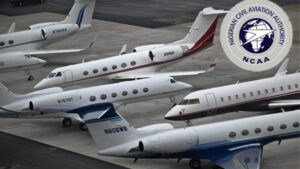According to the Nigeria Civil Aviation Authority, airstrip operators who do not obtain the necessary permits will be subject to sanctions beginning January 1, 2026.
This was said by Engr. Godwin Balang, the NCAA’s Director of Aerodrome and Airspace Standards, at a stakeholder engagement event for airstrip operators and owners on Monday in Lagos.
The event, themed “Enhancing Safety, Compliance, and Collaboration for Efficient Airstrip Operations,” represented the debut edition of such an engagement.
Balang claims that there are 92 airstrips in Nigeria, including those that are operating, non-operational, and undergoing construction or repair. Only a small number, meanwhile, now adhere to safety and legal requirements.
Two of our international airports were recertified late last year as part of our efforts to maintain aviation safety, and work is still on to certify further airports,” he said.
Balang added. Additionally, the Federal Airports Authority of Nigeria (FAAN) has been notified that any municipal airport under its control that operates without a valid permission will be subject to sanctions as of January 1, 2026. This is a group decision to enforce compliance rather than a threat.
According to information obtained by The PUNCH, of the 92 airstrips in the nation, 24 are privately owned and operated, while 68 are overseen by the Federal Government via the Ministry of Aviation and Aerospace Development.
Balang emphasized the need for greater collaboration between the NCAA and the Ministry to define the roles of operators and regulators clearly.
He also announced the NCAA’s intention to develop localized operational guidelines for airstrips, citing the need to adapt regulatory strategies to the evolving aviation landscape.
“Although the term ‘aerodrome’ encompasses airstrips, there is a need for distinct policies tailored to the specific nature of airstrip operations,” he added.
While referring to Section 71 (3) and (4)(a) of the Civil Aviation Act (CAA) 2022, which authorizes the NCAA to certify and issue permits for aerodrome operations and to establish safety standards for their design, operation, and maintenance, Balang stressed that the stakeholder forum aligns with this mandate and seeks to advance airstrip regulation across Nigeria.
Echoing Balang’s remarks, the Director General of the NCAA, Capt. Chris Najomo stressed the importance of regulating not just aircraft and personnel, but the entire operational environment.
Najomo said, “Aviation has evolved beyond focusing solely on machines and personnel. A poorly regulated operating environment poses significant risks.
“Global and regional bodies now recognize this reality, prompting us to expand and intensify oversight over all types of aerodromes including airstrips in the interest of safety.”
Najomo also stated that the engagement underscores the agency’s commitment to strengthening oversight, with a focus on airstrip operations.





